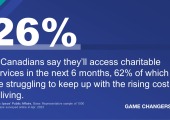CANADIANS NOT ALREADY SELF-EMPLOYED INTERESTED IN RUNNING THEIR OWN BUSINESS
CANADIANS NOT ALREADY SELF-EMPLOYED INTERESTED IN RUNNING THEIR OWN BUSINESS
The Canadian Professional Sales Association commissioned this Angus Reid Group poll. It was conducted by telephone between May 20th and 26th, 1998 among a representative cross-section of 1,500 Canadians. Within this sample, 862 people are considered entrepreneurial Canadians (that is, they either currently own or are interested in owning their own business). The associated margin of error for the entire sample is +\-2.5 percentage points and +\- 3.3 percentage points for the questions only administered to entrepreneurial Canadians. The margin of error will be larger within regions and for other sub-groupings of the survey population.
These data were statistically weighted to ensure the sample's regional and age/sex composition reflects that of the actual Canadian population according to the 1996 Census data.
HALF (47%) OF CANADIANS NOT ALREADY SELF-EMPLOYED INTERESTED IN RUNNING THEIR OWN BUSINESS
Sales Bottoms Out Along with Politics as Future Career Choice
Canadian entrepreneurs say business relationships more important than business acumen
A recent survey of Canadian entrepreneurs commissioned by the Canadian Professional Sales Association (CPSA) and conducted by The Angus Reid Group reveals that people most interested in running their own company place business relationships (38%) well ahead of business acumen (15%) in importance when it comes to being a successful entrepreneur.
The Angus Reid Group poll was conducted for the CPSA between May 20th and 26th, 1998 among a representative cross-section of 1,500 Canadians. Within this sample, 862 people are considered entrepreneurial Canadians: that is they currently own or are interested in owning their own business. The associated margin of error for the entire sample is +\- 2.5 percentage points and +\- 3.3 percentage points for those questions administered only to entrepreneurial Canadians. The margin of error will be larger within regions and for other sub-groupings of the survey population.
The survey asked Canadians whether or not they would be interested in running their own business. Almost half (47%) of all Canadians who do not currently own their own business said they would be interested in running their own business. Canadians were also asked their career of choice, if they were choosing a career today. The most popular career choice was in computers/ high tech at 23%. Only 1% of those polled expressed interest in a sales career, tied with politician and stockbroker or executive.
When "entrepreneurial Canadians" (that is, those interested in running their own company) were asked to choose the most important characteristic of a successful entrepreneur from a list of 10 options, 38% chose "initiating and building business relationships". That response won out over the next most popular answer by a margin of more than two to one, when 15% said "business acumen, or having a good head for business" is the most important characteristic. Only 4% said being a good salesperson was most important, even though 98% agree that a good entrepreneur must understand the basic rules of selling their product or service, and 82% agree "closing the deal is critical to every business encounter".
"We believe that building positive business relationships is the cornerstone of sales success," says Terry Ruffell, President of the CPSA. "And entrepreneurs clearly understand that moving their product or service is critical. But when you call these skills 'sales', entrepreneurs simply don't identify with them."
Entrepreneurial Canadians were asked to select from paired choices which item is most important to being a successful entrepreneur. They ranked managing their own time (56%) ahead of managing people (43%); persuading and convincing people (67%) over accepting what people tell you (32%); and having one's income directly tied to performance (57%) ahead of having a steady source of income (42%). "Again, these are all factors imperative to sales success," adds Ruffell.
Nevertheless, being an effective manager (68%) won out by more than two to one over being a good salesperson (31%) when respondents were asked which was more important to being a successful entrepreneur.
"The same people who will tell you that 'understanding the basic rules of selling' and 'closing the deal' are essential to being a successful entrepreneur will rank being a good salesperson at the bottom of the list in terms of success factors," adds Ruffell. "Clearly the problem is the label 'sales'. The more entrepreneurs come to understand that they need to be sales experts, the more comfortable they'll be developing new business opportunities, and the more successful they will be."
When asked to evaluate themselves on a number of criteria, entrepreneurial Canadians report that they consider themselves skilled in most areas determined critical to the success of an entrepreneur. However, when the percentage of respondents who say they strongly agree that they have the skills are compared to those who only somewhat agree, some areas of relative strengths and weaknesses emerge. In particular, looking at those who strongly agree that they possess the specified skills, areas of relative weakness include building business relationships (43%), having a good head for business (37%) and being persuasive (31%). Less than one-half of entrepreneurial Canadians strongly agree that they have these skills. Conversely, entrepreneurial Canadians are more confident in their abilities to be a good listener (66%), balance numerous tasks (63%) and be an effective communicator (53%).
In addition, 80 per cent strongly agree that "a good entrepreneur must understand the basic rules of selling their product or service". In spite of this, very few (29%) strongly agree they have "devoted time to learning sales skills". Still, 44% reported they had read a book that was related to sales; 42% had enrolled in a professional development course; 36% had attended a seminar where sales was discussed and 28% had taken out a membership in a professional association.
Adds Ruffell, "You can argue that nothing happens in any business until somebody sells something, whether it's an idea, a product, or a service. Clearly almost anyone will benefit professionally from improving their sales skills, whether or not they are in a traditional professional sales role."
The Canadian Professional Sales Association has been representing sales professionals since 1874. The organization provides more than 32,000 members with tools, resources and training in both French and English. CPSA members also receive savings on travel, hotel, car leasing and rentals, insurance rates and financial services.
These data were statistically weighted to ensure the sample's regional and age/sex composition reflects that of the actual Canadian population according to 1996 Census data.
For more information on this news release, please contact:
John Wright
Senior Vice-President
Angus Reid Group
(416) 324-2900Sharon Armstrong
Director of Marketing
CPSA
(416) 408-2685
(888) 267- CPSA (2772)
More insights about Consumer Goods


![[WEBINAR] KEYS: Global Trends - The Uneasy Decade](/sites/default/files/styles/related_more_insights/public/ct/event/2025-09/thumbnail-templates_0.png?itok=Qh37M2xL)
![[WEBINAR] Canadian EV Adoption Trends in 2025](/sites/default/files/styles/related_more_insights/public/ct/event/2025-01/thumb.png?itok=RSGzZvMm)
![[WEBINAR] Sustainable Packaging: A Potential Avenue of Distinction](/sites/default/files/styles/related_more_insights/public/ct/event/2023-09/SustainablePackaging_WebR_feature%20copy.jpg?itok=X0DpNf_C)